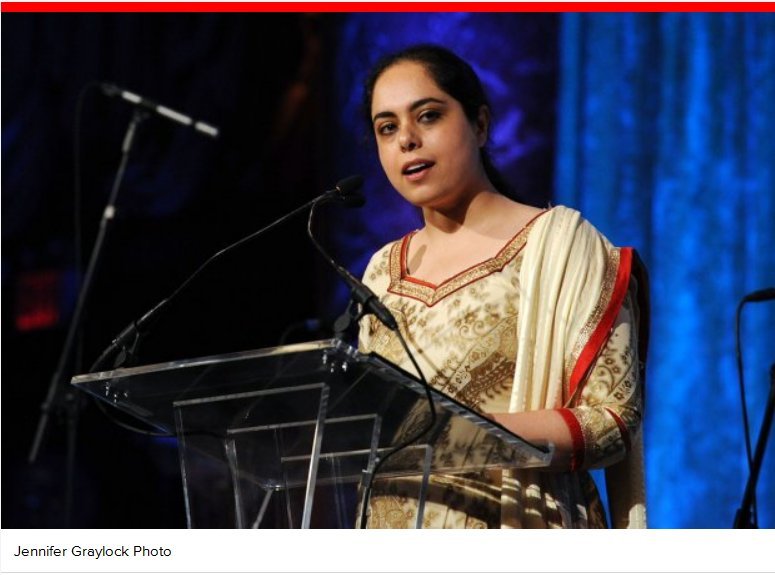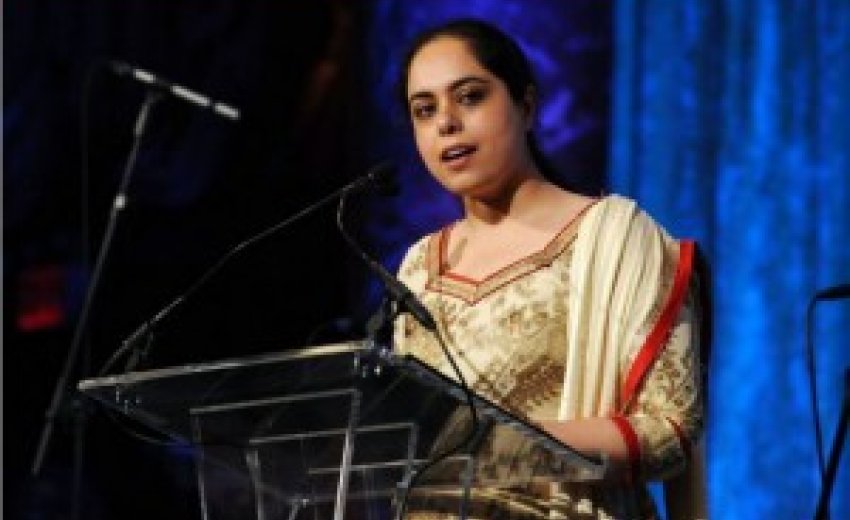Growing up Sikh in New Jersey in the 1960s and being bullied because of her background and religion, Sapreet Kaur seeks to lift up all of humanity in ways both big and small.

April 24, 2014: This week, I was recognized at the Auburn Seminary “Lives of Commitment” Breakfast Gala in New York City. It was an honor to stand alongside incredible women who are changing our world. I would not have been standing there without my parents and brother, who were there today. And of course the incredible team at the Sikh Coalition.
My parents arrived from Punjab, India in the 1960s to pursue the American dream. When they made New Jersey home, there were few Sikh families here. Our articles of faith, especially our long hair, stood out. It was a rare sight to see a star left fielder at a little league game with long hair wrapped in a turban; that was my brother. Or a little brown girl with two long braids and a wide smile in every school picture; that was me.
But I only felt the pain of being different when I heard people shout at my father: “Go home towel head!”
My parents could have hid my brother and me from these challenges. Instead, they promised us that our faith as Sikhs could live in harmony with our very American selves.
So we played sports. We joined the Girl Scouts and the Boy Scouts. We made the honor roll. At the same time, we learned the history of the Sikh tradition, that our turbans and long hair represent our commitment to justice, equality, and community—the same values that make America great.
And then at the age of fifteen, my faith was tested.
One moment, I was sitting on a bus with other girl scouts on a leadership trip. The next moment, the bus had flipped over and I found myself pinned under the seats. I could hear other girls crying for help. As fear rolled over me, I closed my eyes and prayed.
“Ik Onkar. Satnam,” I said silently. “There is One God. Truth be His Name.”
As I repeated the prayer, I struggled out of the wreckage and used my arms to pull the rest of my body free. I was saved. But many others died that day.
As I mourned my friends, I wondered why I lived. In the Sikh prayer called Ardas, we recite:
“Naanak Naam Chardi Kala, Tere Bhaaney Sarbat Daa Bhalaa. In the Name of God, we find everlasting optimism. Within Your Will, may there be grace for all of humanity.”
All of humanity.
That was it. That was the moment I finally understood. To be a Sikh is to serve humanity. I will never know why I lived. But I realized that I had to make my life worth saving. And that would be a life that lifted up all of humanity in ways both big and small.
My story is part of the American story. It’s the story of that desire in each of us to lead a meaningful life and leave this world a better place.
Recently, hate has devastated our country—we saw it in the blood spilled in a Sikh house of worship in Oak Creek, Wis. on a Sunday morning and on the steps of a Jewish Community Center in Kansas the weekend before Passover. I know that this hate comes from the same ignorance that I watched my father brave when I was a child.
The Sikh Coalition, with committed partners like Auburn, are working together to end hate in America. I believe that you and you and me—all of us together—can move this work forward today. The first step to loving our neighbors is knowing our neighbors.
I invite you to take a moment to learn about the Sikh faith. You can even go to our website sikhcoalition.org where you’ll see an image of smiling faces and the title “Who are Sikhs?”—click on it. Take a minute to soak in the stories of your Sikh neighbors. Then share it with five friends. Ask them to do the same.
That’s it. This simple act will help heal and repair the world.
My son, Zoraver Singh, is turning four next week. He is my daily source of inspiration. He shows me how to live in “Chardi Kala,” boundless optimism. My hope is that one day Zoraver will be able to walk the streets of New Jersey and New York and everywhere in this nation with his head held high, that he will never feel the pain of hate, that he will have a chance to serve humanity, that his neighbors will know him and love him as a Sikh and as an American. And that you all will help make that day come.
Editor’s Note: This article was adapted from a speech given by Sapreet Kaur, Executive Director of The Sikh Coalition, who was honored at the Auburn Seminary “Lives of Commitment” Breakfast Gala in New York City on April 23. Auburn Seminary equips bold and resilient leaders of faith and moral courage to build congregations and communities, bridge divides, pursue justice, and heal the world. Learn more at AuburnSeminary.org.
